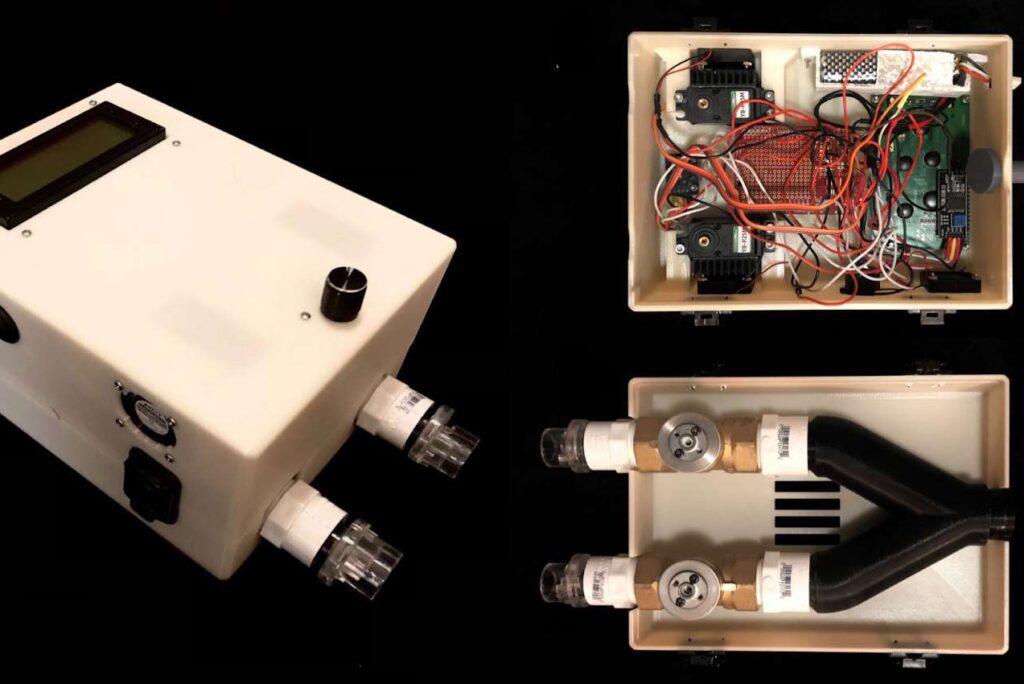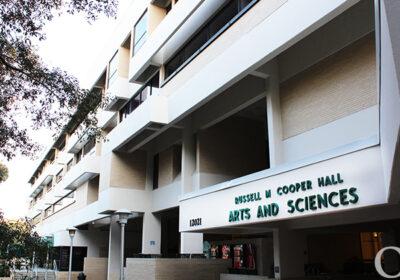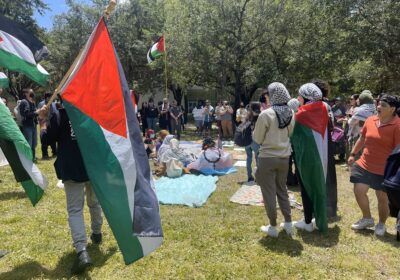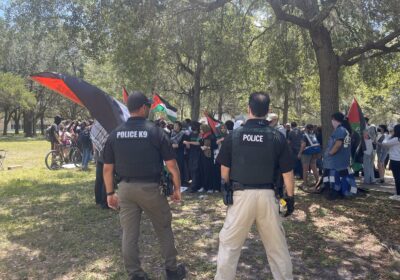USF alumni win nationwide competition with innovative ventilator prototype

With cities across the U.S. experiencing ventilator shortages over the past year as hospitalizations rose due to COVID-19, a group of USF alumni won $20,000 in a national competition for the creation of a low-cost ventilator prototype to address the growing issue.
Biomedical engineering alumni Abby Blocker, Carolyna Yamamoto Alves Pinto and Jacob Yarinsky created Eucovent, a device resembling a small box that splits the airflow from one ventilator to two patients, during fall 2020 as their capstone project for their biomedical engineering design class.
Besides its low cost of $150 compared to regular ventilators, which range between $5,000 and $50,000, Alves Pinto said the device hooks to a ventilator machine and alternates the airflow so each patient gets breaths at different times and not simultaneously. This allows physicians to get data from each individual patient who uses it.
“So these other devices that tried co-ventilation, they try to split the air, the breath between two patients at the same time,” Alves Pinto said. “So we have this alternation of the breaths being delivered and that’s something that no other device in no other group has ever tried before.”
The device was submitted to the National Institute of Biomedical Imaging and Bioengineering to compete in the Design by Biomedical Undergraduate Teams Challenge, securing first place and winning a $20,000 prize. The team competed with 76 projects from 47 universities across the U.S., including Rice, Columbia and Stanford.
“I honestly didn’t believe it,” Blocker said. “Like I was in a meeting, and I saw the texts from my group members and they were freaking out and … I didn’t know why and then I checked my email and I couldn’t believe it. I couldn’t even focus the rest of the meeting. It’s just so exciting.”
The prize, Blocker said, will be divided equally among the team members.
Blocker, Alves Pinto and Yarinsky will be recognized at the annual Biomedical Engineering Society conference, which will take place Oct. 6-9 in Orlando. They’ve already started the process to patent their invention, according to Alves Pinto.
As a way to continue improving the project, they decided to pass it on to a group in the capstone class. Their ultimate goal is to get the device approved by the Food and Drug Administration and sell it to a medical company or open their own start-up.
“Even if it just takes too long to get approval and it doesn’t work for the pandemic, just in maybe rural areas or things like that having this device if they only have for example one or two ventilators, kind of just like increasing the amount of patients that they can treat,” Blocker said.
After months of meetings with their mentors, working on research and having late nights at the lab, the team tried it out on test lungs until it was successful.
“We thought of so many things in so many different prototypes that we had in our heads at the beginning,” Alves Pinto said. “And then just working through all of them and actually seeing the device progress and having something at the end that actually worked was one of the best moments.”
However, trying out the different ideas and seeing them fail wasn’t always easy. At one point, Alves Pinto said the team was stuck until Christopher Passaglia, professor in the department of medical engineering and one of the project mentors, proposed alternating the breaths.
“Once he suggested [alternating the breaths] to us, we completely changed the way the device worked, the way the device looked, all of the components that we would have to buy and implement into the device,” Alves Pinto said.
“So it was really like trying a lot of things, having like these initial ideas, and then I guess we failed more than what we would like to but in the end, everything worked out.”
Like Passaglia’s help, the guidance of Souheil Zekri, professor of the capstone class, and other mentors from Moffitt Cancer Center, such as Aaron Muncey, Heiko Enderling and Stefano Pasetto, were crucial for the success of the project, according to Yarinsky. He said they created a supportive environment that supported them throughout the project.
“They really were just welcoming and supportive, and allowed us to be the experts and to steer the project in a way that we believed in and allowed us to fail, when we failed,” Yarinsky said. “It was just a really great experience where everyone’s expertise was so unique.”
Once the team was done with the project, they discussed participating in the Jabil Innovation Technology Challenge, a competition where Florida university and college students show their solutions to globally relevant topics. Alves Pinto submitted a video explaining Eucovent even though she said they didn’t have high expectations.
“We ended up getting first place in that competition and that was a really good feeling,” Alves Pinto said. “It boosted our morale so much.”
Having students from the first cohort of the biomedical engineering major win a nationwide competition meant a lot to the medical engineering department, Zekri said. He believes it is a good start for that program.
“We’re very ecstatic about the outcome from this first full year of capstone experience,” Zekri said. “And we’re looking forward to continuing to improve and continue to develop the students.”







